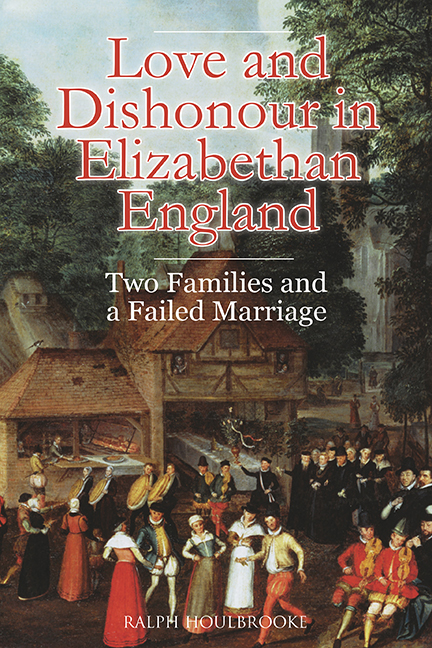Book contents
- Frontmatter
- Dedication
- Contents
- List of Illustrations
- Preface and Acknowledgements
- Notes on the Spelling of Names, Dates, and Currency
- List of Abbreviations
- map
- Miscellaneous Frontmatter
- Introduction
- Part I Two Families
- Part II An Unfortunate Marriage
- 4 A Clandestine Marriage
- 5 The End of the Marriage
- 6 Two Cases in the Court of Requests
- Part III Afterwards
- Bibliography
- Index
4 - A Clandestine Marriage
from Part II - An Unfortunate Marriage
Published online by Cambridge University Press: 13 July 2019
- Frontmatter
- Dedication
- Contents
- List of Illustrations
- Preface and Acknowledgements
- Notes on the Spelling of Names, Dates, and Currency
- List of Abbreviations
- map
- Miscellaneous Frontmatter
- Introduction
- Part I Two Families
- Part II An Unfortunate Marriage
- 4 A Clandestine Marriage
- 5 The End of the Marriage
- 6 Two Cases in the Court of Requests
- Part III Afterwards
- Bibliography
- Index
Summary
Charles, the eldest of the three known sons of Robert and Frances Forth, was christened on 12 July 1565 at Benhall, the home of his widowed maternal grandmother Mary Glemham, about eight miles north of his father's house at Butley. Mothers and other relatives frequently assisted young women in childbirth, and Mary Glemham's residence nearby made a stay in her house convenient for Frances Forth. Charles probably owed his given name to his Glemham ancestry, and possibly to his grandmother's personal choice. Charles was not a very common first name in Tudor England. However, Charles's maternal great-grandfather Sir John Glemham had been a first cousin of Charles Brandon, duke of Suffolk, Henry VIII's brother-in-law. Charles's grand¬father Edward Glemham and his great-uncle Christopher had as young gentlemen both served in the duke's household. Mary Glemham died in May 1571, leaving Charles the considerable sum of £100, to be paid him at twenty-one.
We know very little about Charles Forth's childhood. Two local men, John Long of Capel and John Hatch of Butley, left him quite valuable bequests in their wills: Long a suckling colt just taken from its mother, and Hatch a coin worth twenty shillings. Perhaps they liked the young Charles, whom they had known during his childhood years, and also hoped for the favour of the locally powerful Forths towards their own heirs.
For many years, Charles was Robert's and Frances's only son. When he was about fourteen, as his father later recalled, that is in 1579–80, Robert placed Charles at Norwich, forty-eight miles from Butley, with Mr Birde a ‘very reverend, grave and godlye’ schoolmaster or teacher, so that he might be brought up in the fear of God, learning, and knowl¬edge of the Latin tongue and good letters. It is not clear where Charles had been educated before this, but Robert's testimony suggests that this was the first time Charles had been sent so far away from home. Fourteen was an age when some youths were already at university. It seems quite a late age at which to send a boy away to board with a master for the first time. The fact that Charles was for a long time Robert's only son may have made him a protective father, reluctant to let his heir too far out of his sight.
- Type
- Chapter
- Information
- Love and Dishonour in Elizabethan EnglandTwo Families and a Failed Marriage, pp. 111 - 142Publisher: Boydell & BrewerPrint publication year: 2018

